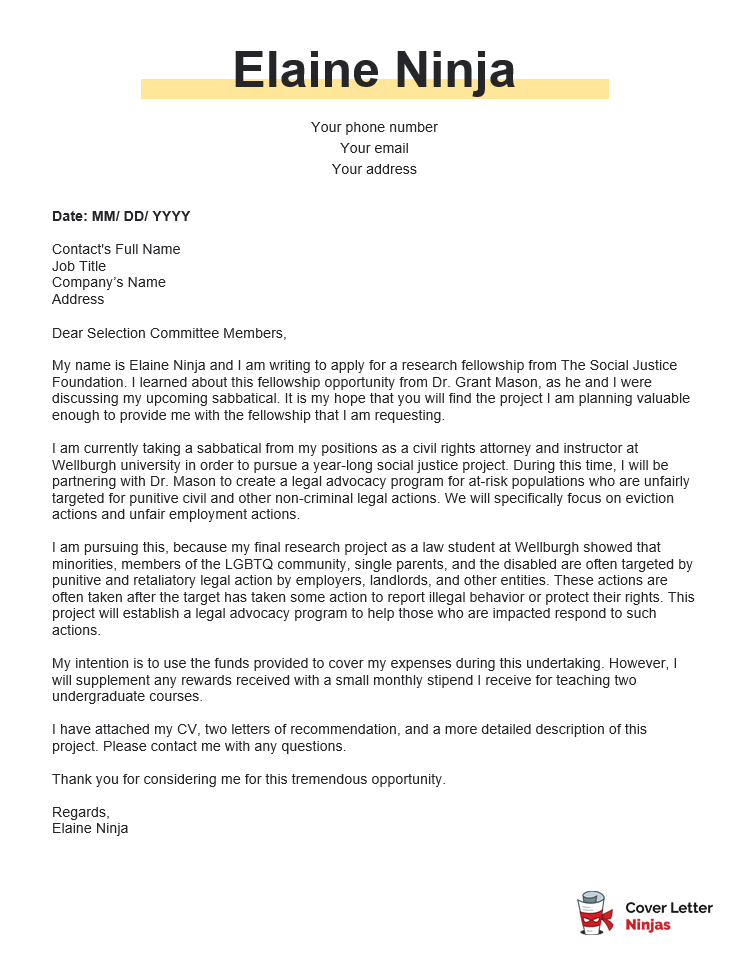

Winning a fellowship is a huge accomplishment, whether from your university or from an outside source. Because they are so highly competitive, students can place such an achievement on their resumes/CVs, later on, will always have an edge.
Applying for a fellowship is much like applying for a job. You will need a strong resume that is accompanied by a cover letter. That cover letter for a fellowship is a critical piece of your application packet because it is your personal introduction and encapsulation of your major achievements during your academic career thus far.
As well, you want to show that you have clear career goals and how this fellowship will help in their achievement. To help with this, we have included a sample letter and some writing tips.
Here is a sample cover letter from a student who is seeking a fellowship to undertake a special project through an academic department at their university.

Dear Selection Committee Members,
My name is Elaine Ninja and I am writing to apply for a research fellowship from The Social Justice Foundation. I learned about this fellowship opportunity from Dr. Grant Mason, as he and I were discussing my upcoming sabbatical. It is my hope that you will find the project I am planning valuable enough to provide me with the fellowship that I am requesting.
I am currently taking a sabbatical from my positions as a civil rights attorney and instructor at Wellburgh university in order to pursue a year-long social justice project. During this time, I will be partnering with Dr. Mason to create a legal advocacy program for at-risk populations who are unfairly targeted for punitive civil and other non-criminal legal actions. We will specifically focus on eviction actions and unfair employment actions.
I am pursuing this, because my final research project as a law student at Wellburgh showed that minorities, members of the LGBTQ community, single parents, and the disabled are often targeted by punitive and retaliatory legal action by employers, landlords, and other entities. These actions are often taken after the target has taken some action to report illegal behavior or protect their rights. This project will establish a legal advocacy program to help those who are impacted respond to such actions.
My intention is to use the funds provided to cover my expenses during this undertaking. However, I will supplement any rewards received with a small monthly stipend I receive for teaching two undergraduate courses.
I have attached my CV, two letters of recommendation, and a more detailed description of this project. Please contact me with any questions.
Thank you for considering me for this tremendous opportunity.
It’s no secret that academic jobs and fellowships in particular are highly competitive. Nature Magazine reports that most early-career researchers need to file at least 15 applications to land a single offer. Moreover, job seekers who submit more applications end up getting a higher number of on-site interviews.
What this data means for you is that you’d have to get a good dozen of customized cover letters ready. Below are several actionable tips to help you churn out those sample fellowship cover letters with high confidence!
While many grants and scholarships are intended for a wide range of students, that’s not the case with a fellowship. These are often rewarded to students or other academic professionals who are pursuing very specific academic or research goals. In the case of the example above, the applicant is conducting a project with the support of their university and employer.
The best way to be sure you qualify is to read the materials associated with the fellowship and get to know the purpose of the organization offering the award. This way you only go after options that you have a high chance of receiving.
ADVICE FROM OUR EXPERTOutlining your accomplishments and leadership experiences in a succinct, effective way is important when writing a cover letter for a fellowship. It may be tempting to make it a long document, but getting the point across in less than a page will keep the reader’s attention.

Debi Douma-Herren
Senior Certified HR Professional & Career Coach
Your CV and transcripts will only show what you have done so far. You are pursuing the fellowship to achieve future goals. This is your chance to introduce these goals and explain your intentions. Thus your letter should contain enough detail to help the reader fully understand your plans and concrete steps you intend to take to lead the project to successful completion.
If you are applying for a fellowship, you are a degreed professional. Chances are you work in the field and may be in charge of undergraduate students in your department even if you are just a postdoctoral employee. You have established your competence in your academic discipline and should write your cover letter accordingly. Be confident in the value of your research and academic pursuits. Refer to yourself using proper titles. Show respect and gratitude for consideration, but don’t fawn. Avoid seeming as if you are asking for permission to pursue your planned course of action.
While there is nothing wrong with pursuing graduate education for career purposes, consider the perspective of the selection committee. In many cases, this group consists of individuals with a stake in your field, the university, and the community at large. They want to know that funding you is something that will be worthwhile to them and their goals. Use your letter to show how your education or research will be helpful to your school, local community, or your colleagues.